A great opportunity to work at the cutting edge of AI and cognitive science!
03.11.2025 10:28 — 👍 2 🔁 1 💬 0 📌 0Kozzy Voudouris
@kozzyvoudouris.bsky.social
AI | Cognitive Science | Linguistics
@kozzyvoudouris.bsky.social
AI | Cognitive Science | Linguistics
A great opportunity to work at the cutting edge of AI and cognitive science!
03.11.2025 10:28 — 👍 2 🔁 1 💬 0 📌 0
What influences whether people have fun with a task?
Our paper “Leveling up fun: learning progress, expectations and success influence enjoyment in video games” with @thecharleywu.bsky.social and @ericschulz.bsky.social now in Scientific Reports!
rdcu.be/eI069
Paper summary below 1/4

Happy to announce our paper got accepted to #NeurIPS!
@akjagadish.bsky.social @marvinmathony.bsky.social @ericschulz.bsky.social & Tobi Ludwig
arxiv.org/abs/2502.00879
Excited for this paper to be out, literal years of hard work by Kozzy. Excitingly, my first last author paper!
This work came from joining the Kinds of Intelligence group at Cambridge and being given time by @martahalina.bsky.social to explore and cross disciplines. Hard work but very fun! 🧪 🤖🧠
@matishalin.bsky.social @martahalina.bsky.social
18.09.2025 10:47 — 👍 0 🔁 0 💬 0 📌 0
We find that recurrence confers a significant advantage for learning more complex grammars, but lamination does not.
This work would not have been possible without Matishalin Patel, Colin Klein, Marta Halina, and Andrew Barron. You can check out our preprint here: arxiv.org/abs/2509.13968.
2) The evolution of lamination, in which information is processed by independent sub-components.
We test these networks on artificial grammar learning tasks, for which the complexity of the problem can be precisely stated.
We focus on two transitions
1) The evolution of recurrent systems, in which information feeds back to earlier parts of the network.
In a new preprint, we explore this hypothesis with a computational approach. By systematically evolving neural nets with different structures, we measure whether key structural transitions improve performance on more complex problems, while controlling for the resources available to the network.
18.09.2025 10:45 — 👍 3 🔁 0 💬 1 📌 0The arrangement of neurons is adjusted, using similar resources but opening up the possibility for more complex behaviour. This helps to explain the huge diversity of cognition we see across our planet: from nematodes 🪱 and box jellyfish 🪼 , to bees 🐝 , octopus 🐙 , chimpanzees 🐵 , and us 🙋 .
18.09.2025 10:45 — 👍 3 🔁 0 💬 1 📌 0What if the same is true for the evolution of cognition?
It has recently been argued that the evolution of brains across the animal kingdom can be characterised in terms of just a few major structural changes.
A prominent idea in biology tells us that evolution is not always incremental, but often involves a few important structural changes that open up phylogenetic possibility.
Think: single cells ➡️ multicellular life. Solitary individuals ➡️ eusocial colonies.
That's certainly a hard part too, I can't deny that!
03.09.2025 07:27 — 👍 0 🔁 0 💬 0 📌 0Thanks @dmoralesp.bsky.social, I'm interested to hear your thoughts!
02.09.2025 11:23 — 👍 0 🔁 0 💬 0 📌 0You can check out the published article here (doi.org/10.1007/s105...) and a pre-print here (philsci-archive.pitt.edu/26165/).
02.09.2025 08:37 — 👍 4 🔁 0 💬 1 📌 0This gives rise to an apparent, but ineffable, distinction between hypotheses. Crucially, this apparent distinction does not necessarily imply a distinction at the level of behavioural processes.
02.09.2025 08:37 — 👍 3 🔁 0 💬 1 📌 0For decades, this distinction has been tacitly assumed but impossible to accurately define. I argue that the apparent distinction is actually an artefact of widespread analogical reasoning based on theories in human psychology and classic behaviourist associative learning theory.
02.09.2025 08:37 — 👍 3 🔁 0 💬 1 📌 0I suggest that the widespread use of analogies explains away one of the most controversial debates in this field: whether associative learning and cognition are distinct behavioural processes.
02.09.2025 08:37 — 👍 4 🔁 0 💬 1 📌 0In my latest thriller, published today in Biology and Philosophy, I argue that one useful hypothesis generation strategy in comparative psychology is analogical reasoning.
02.09.2025 08:37 — 👍 3 🔁 0 💬 1 📌 0The hypothesis space is so large and it requires us to eschew our human-centred expectations about behaviour and cognition.
02.09.2025 08:37 — 👍 2 🔁 0 💬 1 📌 0Doing cognitive science on non-human systems like animals or artificial intelligence, brings inherent challenges. One of them is generating plausible alternative explanations for behaviour that can be tested empirically.
02.09.2025 08:37 — 👍 15 🔁 2 💬 2 📌 1Excited to say our paper got accepted to ICML! We added new findings including this: models fine-tuned on a visual counterfactual reasoning task do not generalize to the underlying factual physical reasoning task, even with test images matched to the fine-tuning data set.
02.06.2025 07:45 — 👍 6 🔁 1 💬 1 📌 1Many thanks to my coauthors @martahalina.bsky.social , @lucycheke.bsky.social, and Ben Farrar for working with me on this project.
23.05.2025 08:03 — 👍 2 🔁 1 💬 0 📌 0You can check out the open-access paper here: psycnet.apa.org/fulltext/202...
23.05.2025 08:03 — 👍 3 🔁 1 💬 1 📌 0We found that comparative psychologists have incredibly diverse attitudes to these methodological challenges. This suggests that there is still a lot of work for both psychologists and philosophers of science to do to clarify fundamental debates at the heart of comparative psychology research.
23.05.2025 08:03 — 👍 1 🔁 1 💬 1 📌 0First, the apparent distinction between associative learning and cognition, and second, the question of whether some explanations of animal behaviour are simpler than others (often discussed with reference to Morgan's Canon).
23.05.2025 08:03 — 👍 1 🔁 1 💬 1 📌 0We surveyed 220 practicing comparative psychologists, asking them questions about two key methodological challenges that define their science...
23.05.2025 08:03 — 👍 1 🔁 1 💬 1 📌 0I am very pleased to announce that my paper "Morgan's Canon and the Associative-Cognitive Distinction Today: A Survey of Practitioners" was published this week in the Journal of Comparative Psychology.
23.05.2025 08:03 — 👍 4 🔁 1 💬 1 📌 0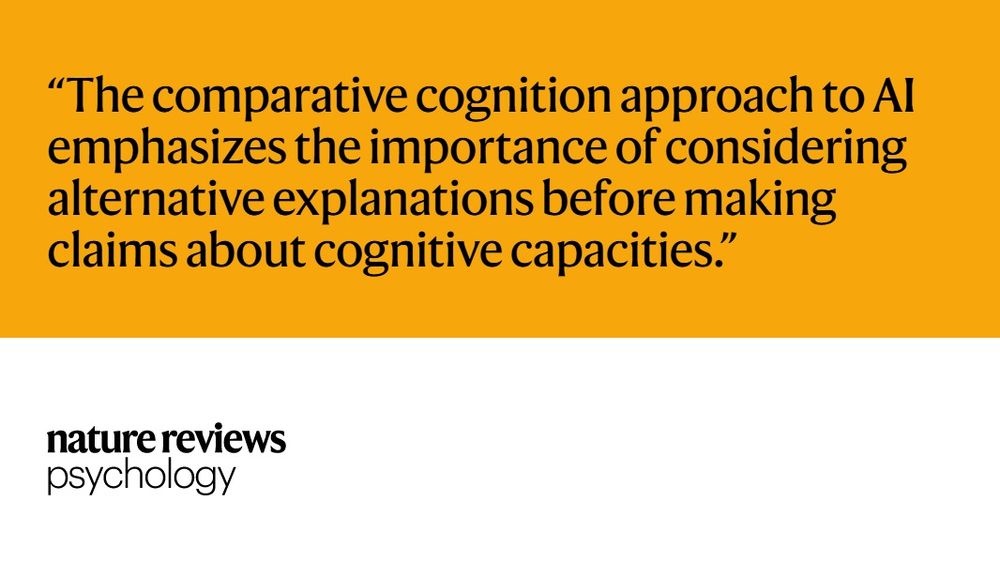
Bringing comparative cognition approaches to AI systems
Comment by Konstantinos Voudouris (@kozzyvoudouris.bsky.social), Lucy Cheke (@lucycheke.bsky.social) & Eric Schulz (@ericschulz.bsky.social)
go.nature.com/43djJlv
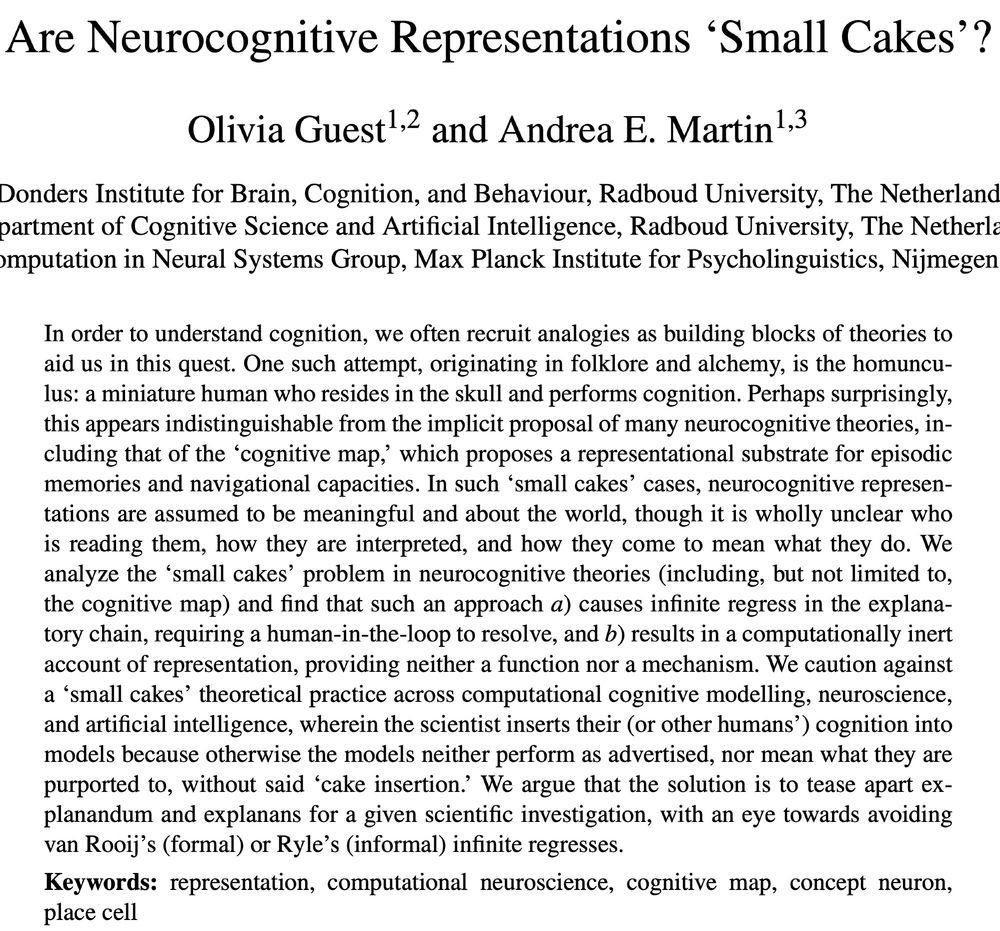
In order to understand cognition, we often recruit analogies as building blocks of theories to aid us in this quest. One such attempt, originating in folklore and alchemy, is the homunculus: a miniature human who resides in the skull and performs cognition. Perhaps surprisingly, this appears indistinguishable from the implicit proposal of many neurocognitive theories, including that of the 'cognitive map,' which proposes a representational substrate for episodic memories and navigational capacities. In such 'small cakes' cases, neurocognitive representations are assumed to be meaningful and about the world, though it is wholly unclear who is reading them, how they are interpreted, and how they come to mean what they do. We analyze the 'small cakes' problem in neurocognitive theories (including, but not limited to, the cognitive map) and find that such an approach a) causes infinite regress in the explanatory chain, requiring a human-in-the-loop to resolve, and b) results in a computationally inert account of representation, providing neither a function nor a mechanism. We caution against a 'small cakes' theoretical practice across computational cognitive modelling, neuroscience, and artificial intelligence, wherein the scientist inserts their (or other humans') cognition into models because otherwise the models neither perform as advertised, nor mean what they are purported to, without said 'cake insertion.' We argue that the solution is to tease apart explanandum and explanans for a given scientific investigation, with an eye towards avoiding van Rooij's (formal) or Ryle's (informal) infinite regresses.
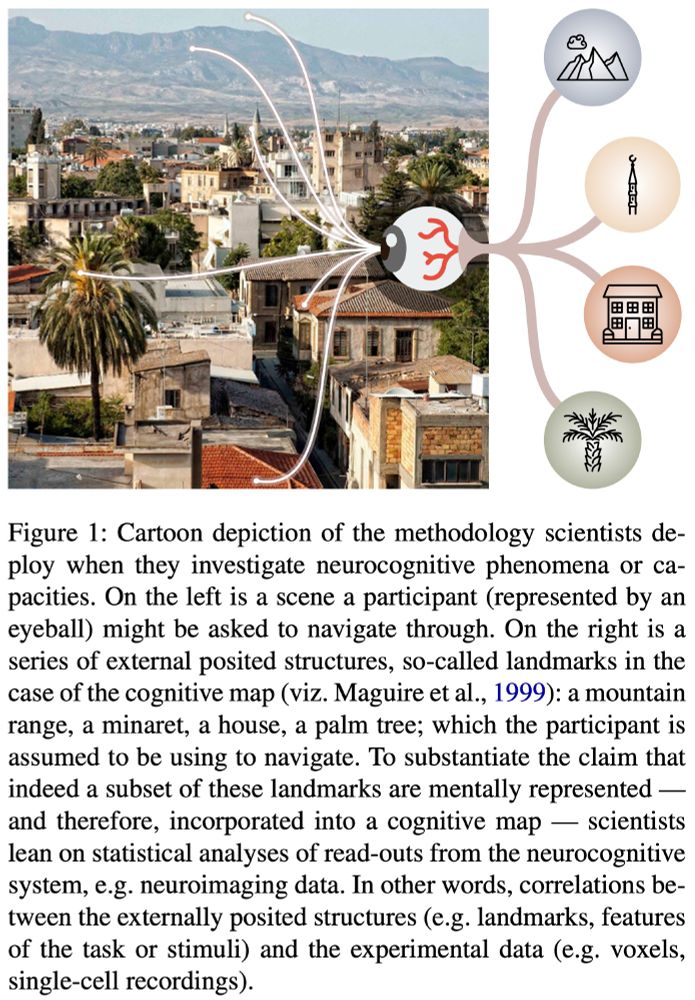
Figure 1 in https://philsci-archive.pitt.edu/24834/
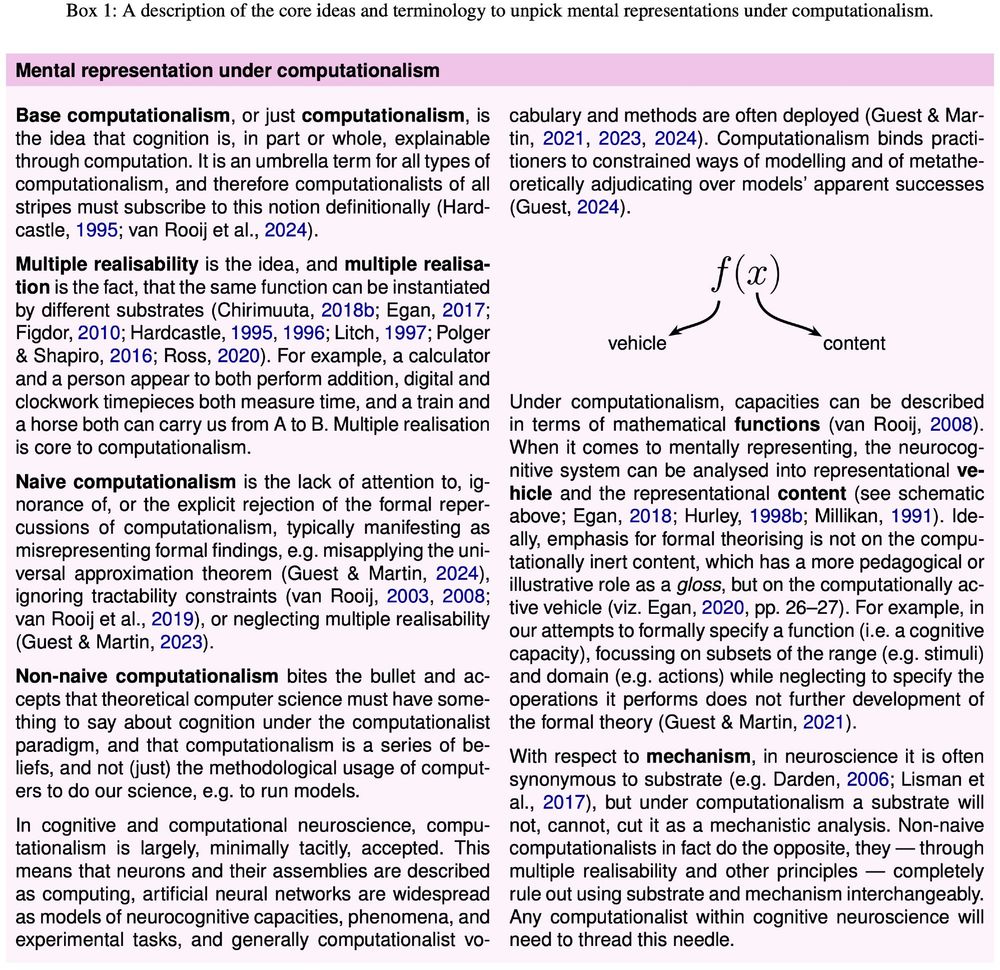
Box 1 in https://philsci-archive.pitt.edu/24834/
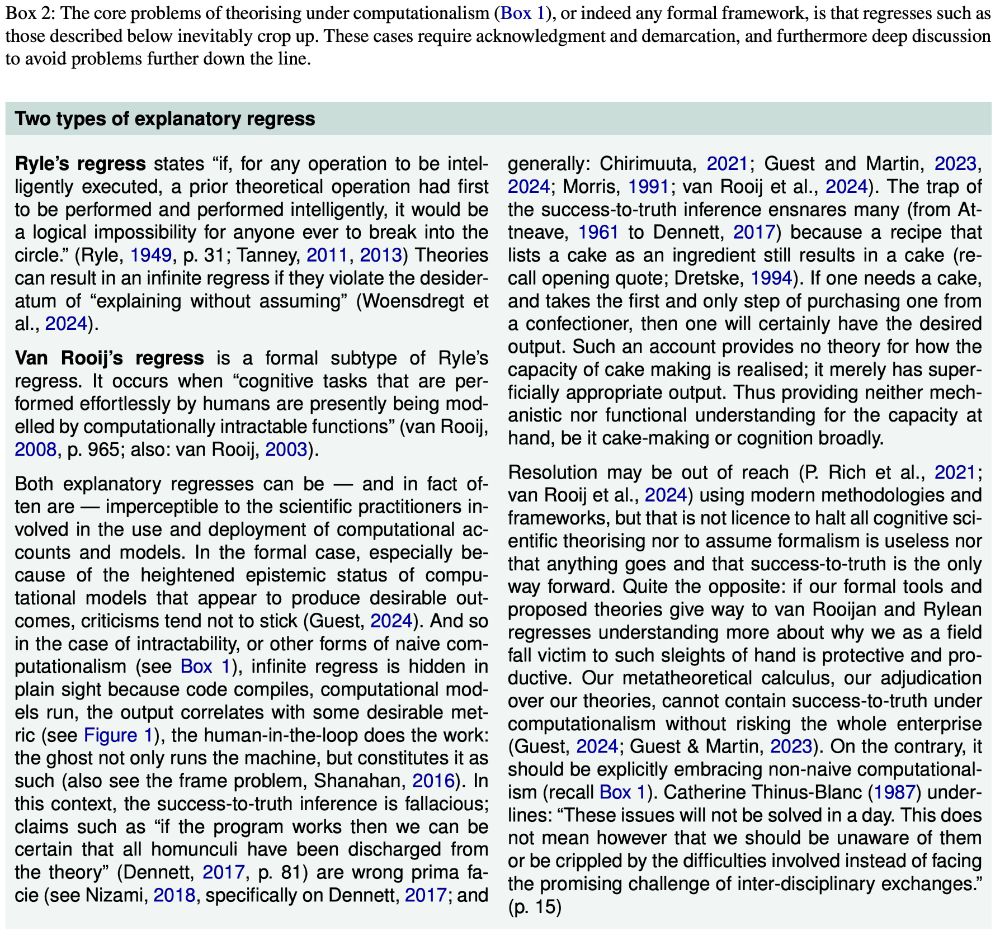
Box 2 in https://philsci-archive.pitt.edu/24834/
Tired but happy to say this is out w @andreaeyleen.bsky.social: Are Neurocognitive Representations 'Small Cakes'? philsci-archive.pitt.edu/24834/
We analyse cog neuro theories showing how vicious regress, e.g. the homunculus fallacy, is (sadly) alive and well — and importantly how to avoid it. 1/